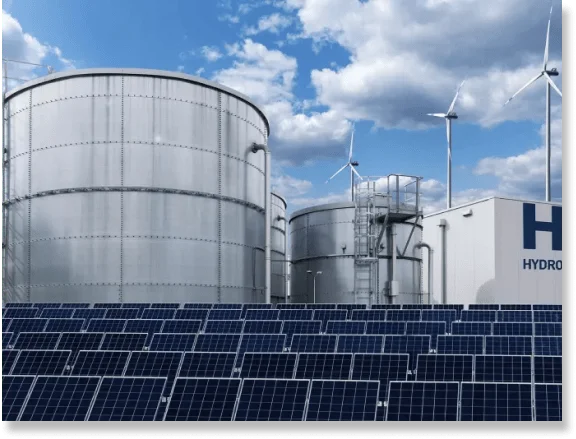Case Study | 23 July 2025
How a Global Petrochemical Company Transformed Its Business by Shifting to Bio-Based Polymers and Reducing Greenhouse Gas Emissions
Posted by : Preeti Wani
In an era where environmental sustainability has become a defining benchmark for industrial success, petrochemical companies are under high pressure to reduce their reliance on fossil fuels and adopt greener practices. This case study explores how a leading global petrochemical company collaborated with Research Nester to change its business model, shifting from conventional petroleum-based production to bio-based polymers and low-emission manufacturing processes. By adopting innovation, forming strategic alliances, and realigning its sustainability goals, the company not only reduced its carbon footprint but also unlocked new revenue streams and regained market leadership in the evolving green economy.

An overview:
- The client is an international petrochemical conglomerate specializing in producing and supplying polymers, synthetic rubber, and high-performance resins. Working in over 100 countries and with manufacturing operations in 27, the company caters to top industries including automotive, construction, electronics, packaging, and consumer goods.
- In the time of growing environmental scrutiny and tightening global regulations, the client realized its traditional dependence on petroleum-based inputs and carbon-intensive processes posed both an environmental liability and a market risk.
- The client thus approached Research Nester to look out for viable pathways to shift toward sustainability without compromising profitability, product quality, or global competitiveness.
- The company was especially interested in embracing circular economy principles, advancing bio-based polymer production, and reducing its overall greenhouse gas (GHG) emissions footprint in alignment with the Paris Agreement.


The Story
Petrochemicals are essential to manufacturing numerous everyday items, including plastics, coatings, synthetic textiles, and packaging materials. However, the industry is also a primary contributor to global carbon emissions, accounting for about 15% of global oil consumption and a major portion of industrial greenhouse gas pollution. The client’s portfolio was heavily dependent on fossil fuel derivatives, and although it had earlier invested in energy efficiency upgrades, the results were not adequate to meet the rising ESG demands.
Furthermore, investor pressure and stringent EU import guidelines threatened to hamper sales unless immediate action was taken. At the same time, the company lacked innovation. Internal R&D expenditure had remained stagnant for five consecutive years, and over 60% of the company's offerings had not undergone material redesign since 2010. Competition from emerging Asian manufacturers providing biodegradable plastics at competitive rates further eroded their market share by nearly 7% in just two years. Geographical expansion was also restricted due to regulatory delays in high-sustainability-compliance regions such as Scandinavia, Canada, and Japan. In addition, operational inefficiencies and a lack of reliable bio-feedstock partnerships limited their ability to produce low-carbon products at scale.
The client recognized that to remain relevant, it needed to redesign its entire value chain, from feedstock sourcing to production methods, logistics, and customer communications. It also needed to rebuild investors' confidence by demonstrating its dedication to a decarbonized, circular economy.
Our Solution:
To support the client's move toward sustainability, Research Nester partnered closely with their executive team leaders, sustainability officers, and R&D departments to redesign and implement a comprehensive, three-phase transformation strategy. This approach emphasized innovation, strategic partnerships, and measurable environmental impact.
Phase 1: Diagnostic and Benchmarking- We began with a comprehensive diagnostic process by applying a full lifecycle analysis (LCA) of the company’s top 20 products to measure the carbon footprint of materials and detect major emission hotspots. Sustainability performance metrics were evaluated against six top global industry leaders in North America, Europe, and Asia-Pacific. With these insights in mind, we recognized underperforming production facilities and suggested targeted retrofitting strategies such as carbon capture integration, thermal optimization, and transitioning to renewable energy sources.
Phase 2: Innovation and Bio-Based Transition- The next phase focused on accelerating innovation. We advised the client to reallocate 15% of its total R&D budget toward the development of bio-based polymers using sustainable raw materials such as sugarcane, corn starch, and agricultural waste. To support this change, we facilitated partnerships with four reliable bio-feedstock suppliers located in Brazil, Indonesia, and Kenya, assuring a secure and traceable supply chain. We also helped set up a pilot plant in Belgium, specializing in the production of PLA and PEF, which are sustainable substitutes to traditional PET and polyester.
Phase 3: Business Realignment and Capacity Building- In the last phase, we introduced a sustainability-linked revenue model that matched business unit performance with key indicators such as recyclability, material circularity, and reductions in Scope 1 and 2 emissions. The product portfolio was strategically redesigned to omit fossil-heavy offerings and launch a dedicated green-label brand, EcoPolym, aimed at distinguishing sustainable products in the B2B market. We also developed an effective roadmap to guide the company toward achieving carbon neutrality by 2040 and reducing absolute greenhouse gas emissions by 35% by 2030, fully in adherence with the Science-Based Targets initiative (SBTi) standards.


Results
- Successful Commercial Launch of Bio-Based Polymers: Within nine months of implementation, the company launched its EcoPolym product line, which involved biodegradable, compostable resins and packaging-grade PLA polymers. These were adopted by five main FMCG brands in Europe and Southeast Asia. By mid-2024, EcoPolym accounted for 12% of the company’s total revenue, with predictions indicating it will exceed 25% by 2026.
- Reduction in Carbon Intensity: By changing 18% of its production to bio-based inputs and retrofitting three key manufacturing plants, the company reported a 9.8% reduction in Scope 1 and Scope 2 emissions within the first year of execution. Power usage per ton of output also fell by 7%, while the carbon intensity of flagship products dropped from 3.1 to 2.5 tons of CO₂e per ton of polymer.
- Strategic Joint Ventures and Market Entry: The company signed a strategic joint venture with a Scandinavian green technology firm specializing in enzyme-catalyzed depolymerization, which is a breakthrough supporting the chemical recycling of polyesters. This created new scopes in Canada and the Nordic countries, where government policies strongly aided green purchasing.
- Rebuilding Investor Relations and Evolving Brand Identity: Following the implementation of the strategy, the company’s ESG rating jumped by 21 points on the Dow Jones Sustainability Ranking. This improvement drew interest from three institutional investors with a focus on low-carbon portfolios. Brand trust also increased across key markets, and the company was honored as Green Manufacturer of the Year at the 2024 Global Plastics Sustainability Forum.
- Intellectual Property and International Presence: The client’s research and development efforts resulted in 215 new patents across bio-polymer synthesis, advanced catalyst technologies, and recyclable barrier coatings areas. The company now has 14 green chemistry pilot plants and development centers located across Europe, India, and North America. It expanded production capacity to 4.2 million metric tons over a year, with more than 32% of this capacity dedicated to sustainable materials.
Conclusion
This change highlights how large-scale petrochemical companies can successfully transform to sustainability-driven growth by using technology, forming strategic alliances, and restructuring their value chains. With Research Nester’s data-driven guidance and market intelligence, the client has shifted from reactive compliance to proactive leadership, setting a baseline for the global chemical industry in the bioeconomy era.
customized message

Preeti Wani is a seasoned Manager – Research & Consulting at Research Nester, with over 10 years of diverse experience in the market research industry, including more than 3 years in a leadership role at the firm. Her expertise spans the Packaging (rigid, flexible, sustainable packaging, barrier technologies), Chemicals & Advanced Materials (specialty chemicals, polymers, coatings, adhesives, composites), and Metals, Minerals & Mining (ferrous/non-ferrous metals, rare earths, industrial minerals, mining technology) sectors.
At the core of her role, Preeti leads end-to-end research and consulting engagements, transforming complex client briefs into structured, insight-rich deliverables aligned with strategic business objectives. She brings a unique ability to balance deep analytical thinking with operational execution, managing cross-functional teams, streamlining research processes, and driving training programs to upskill teams and ensure methodological consistency.
Preeti is actively engaged in client communications, adept at capturing evolving requirements, resolving critical queries, and ensuring the on-time delivery of actionable, high-quality insights. Her consultative approach, combined with strong project management and clear communication, positions her as a trusted advisor for clients navigating fast-moving, innovation-intensive industries.
Recognized for her strategic foresight, leadership, and quality-driven mindset, Preeti continues to play a pivotal role in advancing both client outcomes and internal research excellence at Research Nester.
Thank you for contacting us!
We have received your request for proposal. Our research representative will contact you shortly.
Copyright @ 2026 Research Nester. All Rights Reserved.

